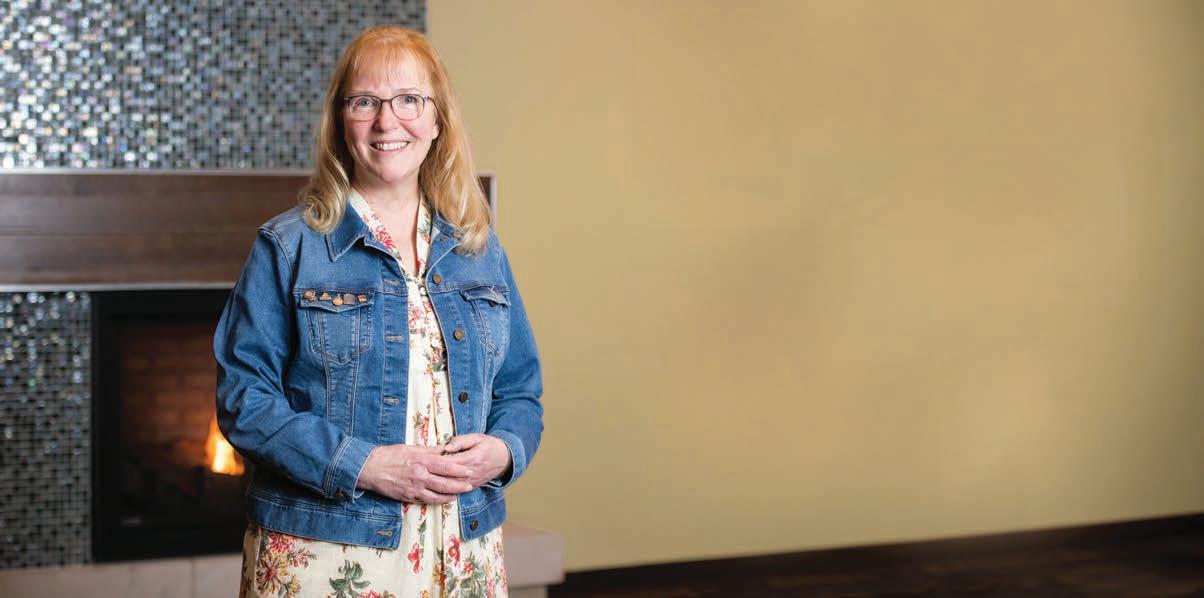
3 minute read
Our Beloved Community
As a Catholic, Franciscan institution, our identity is rooted in values of peace, inclusivity and respect for all of God’s creation. These values have been woven into the fabric of the college since our founding by the School Sisters of St. Francis in 1887.
Not only do these values guide the college’s present work, but they are essential to the sustenance of Alverno’s mission to prepare students to meaningfully engage with the world.
As members of the Alverno community, we are called to find common ground in these Franciscan values and work together to ensure that our beloved community is a place where all are welcome, included, and treated equitably. In our own ways, we are called to share our unique gifts and lead the charge for a more diverse, equitable and inclusive Alverno.
What is shared equity leadership?
There are three main components to shared equity leadership:
• Individuals who are building a critical consciousness around diversity, equity and inclusion
• A shared set of values that serve as a foundation for DE&I work
• Practices that everyone carries out
Source: American Council on Education and Pullias Center for Higher Education
How does this work?
Alverno is turning to the 8 Abilities to guide and carry out our diversity, equity and inclusion (DE&I) work. The Abilities not only provide a lens through which to view our DE&I efforts, but they also provide a toolbox to help carry out this work.
Carrying forth a legacy
Not only does our DE&I work carry forth the legacy of social justice activists, but it also is rooted in the mission and work of the School Sisters of St. Francis. Community outreach to Black communities in the Milwaukee and Chicago areas, as well as the South, grew from providing social services to marching for civil rights and meeting with policy makers. Check out the Alverno Archives for more information on this work, which we carry forth today and into the future.
Who is involved?
This is the work of all, but three campus colleagues in particular are serving as co-directors: Elena Hernández Burke ’22, coordinator of global exchange programs and Hispanic student initiatives; Alexis Carter ’09, assistant director of admissions; and Ronett Jacobs ’98 ’21 EdD, assistant professor of education.
Further underlining the collaborative nature of the work, we are grateful for the Alverno Strong alums who have formed an advisory panel to share their professional DE&I experience:
ALVERNO @ WORK
Marquita Taylor ’09, PhD, had to fight to make room for herself. Now, she fights to make room for others.
Taylor is the assistant director of health equity and leadership programs housed at the Yale School of Public Health, where she works to create spaces and shape policies to advance diversity, equity and inclusion across all corners of the Ivy League institution and in the New Haven community.
Kristina Bell ’07, Diversity, equity and inclusion program manager, Bullhorn

Tammy Belton-Davis ’93, Chief diversity officer, Milwaukee Repertory Theater; Founder and principal, Athena Communications; Trustee, Alverno College
Jessica Marie Langoehr Langill ’15, Equity, diversity and inclusion coordinator, Rogers Behavioral Health
Samantha Maldonado ’09 ’11, Senior manager of diversity and inclusion, Kohl’s; Trustee, Alverno College
Eva Martinez Powless ’06, PhD, Chief diversity, equity and inclusion officer, Milwaukee Area Technical College
By Melissa Zacaula Luna ’22
After completing her bachelor’s degree in business at Alverno and learning to be a servant leader, Taylor felt called to serve her community and help foster real change. After completing her doctorate, she sought an opportunity to “make change in the space,” and she saw the right opportunity at Yale.
“I wanted to help shape lives and to chip away at systems that weren’t created to help Black and Brown people prosper,” she says. “It’s important to me that I do work that is providing access to opportunities and always addresses oppression.”
With her current role, she has pushed for equitable inclusion and consideration of students in grant, fellowship and internship processes. She has also established transformational experiential learning opportunities for students of color.
The work she does has been fulfilling for her as she gets to be “that beacon of hope or light so that there isn’t this ceiling,” says Taylor. “Just being a presence here ― being a young Black woman in a leadership position role ― speaks volumes to the students and the parents who I get to interact with who look like me.”
Being an ally for her students can be simply showing up, whether it’s talking about their mental health or shopping for whiteboards as they prepare for graduate school entrance exams. No matter the day or time, she makes room for students to help them navigate every part of their college career.
Taylor is also a change agent locally and nationally. She has led both the work and declaration of racism as a public health crisis in New Haven, Conn., and the establishment of a minority mental health day there. She contributes to the research and formation of policies around health equity in health care, housing and education in the state of Connecticut.







